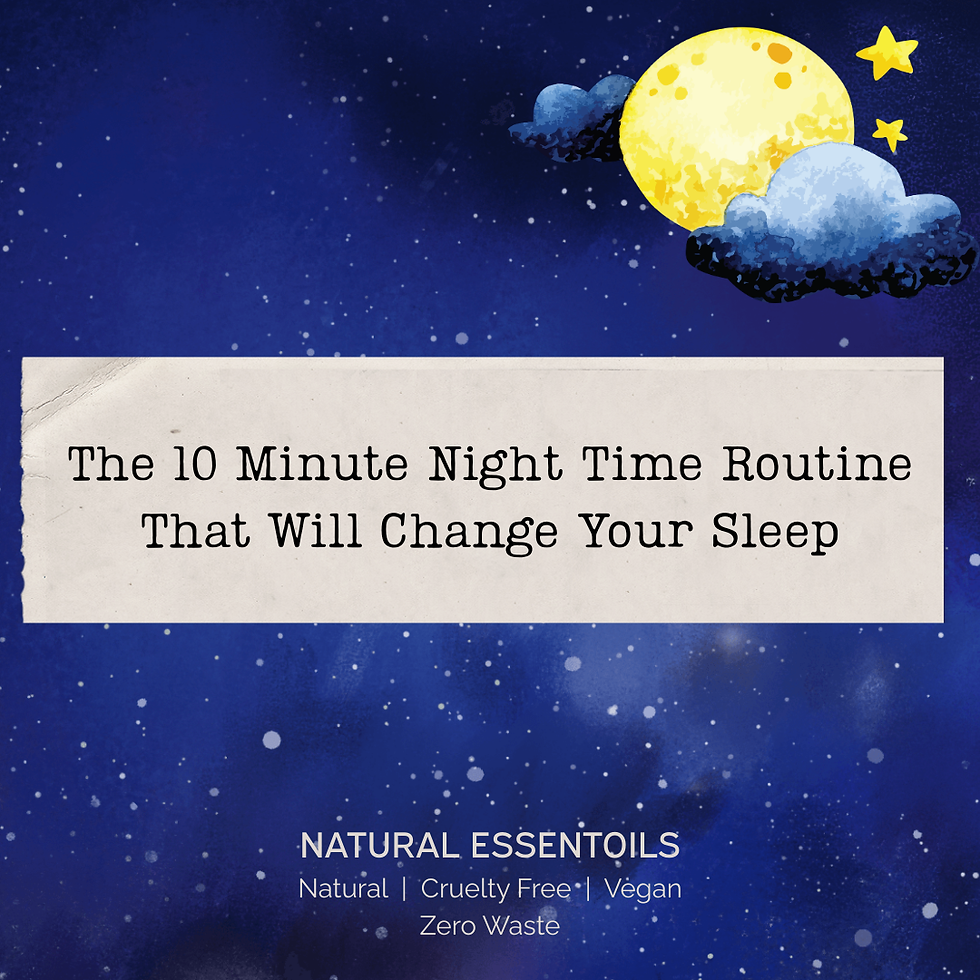10 Fascinating Facts About Sleep
- Natural Essentoils

- Sep 11, 2023
- 3 min read
Sleep is a fundamental aspect of human life, yet it remains a mysterious and captivating subject of study. We spend roughly one-third of our lives asleep, and this essential activity has a profound impact on our physical and mental well-being. In this blog, we'll explore 10 fascinating facts about sleep that shed light on this intriguing aspect of our existence.

1. Sleep Cycles
Sleep is not a uniform, uninterrupted state; rather, it occurs in cycles. These cycles are divided into two main stages: rapid eye movement (REM) sleep and non-REM sleep. Non-REM sleep further consists of three stages, with each stage serving a unique purpose. These cycles repeat throughout the night, with each one lasting about 90 minutes on average.
2. Dreaming in REM Sleep
Most vivid and memorable dreams occur during REM sleep. This is the stage where brain activity closely resembles that of wakefulness. During REM sleep, our eyes move rapidly, our muscles are temporarily paralyzed, and our brain is highly active. It's believed that dreaming may help consolidate memories and process emotions.
3. Sleep Debt
Consistently not getting enough sleep can lead to a phenomenon known as sleep debt. This accumulates over time when we regularly get less sleep than our bodies need. While we can repay some of this debt with extra sleep, chronic sleep deprivation can have long-term health consequences, including impaired cognitive function and increased risk of certain diseases.

4. Sleep and Memory
Sleep plays a crucial role in memory consolidation. During deep sleep stages, the brain processes and stores information gathered throughout the day. This process is essential for learning and retaining new knowledge and skills.
5. Sleep Patterns Change with Age
As we age, our sleep patterns change. Newborns spend most of their time in REM sleep, while elderly individuals tend to experience less deep sleep and more frequent awakenings during the night. These age-related changes can contribute to sleep difficulties in later life.
6. Sleep Needs Vary
The amount of sleep needed varies from person to person and changes throughout our lives. While most adults require 7-9 hours of sleep per night, some individuals function well with as little as 6 hours, while others need up to 10 hours to feel rested. It's essential to listen to your body and find your ideal sleep duration.
7. Sleepwalking and Sleep Talking
Sleepwalking (somnambulism) and sleep talking (somniloquy) are sleep disorders that occur during non-REM sleep stages. These behaviours can range from simple, repetitive movements and mumbling to more complex activities. Sleepwalking is most common in children, while sleep talking can affect people of all ages.
8. Sleep Paralysis
Sleep paralysis is a phenomenon where a person temporarily experiences an inability to move or speak while falling asleep or waking up. This can be accompanied by hallucinations and a feeling of pressure on the chest. It's a natural part of the sleep cycle, but it can be unsettling when it occurs.

9. Lucid Dreaming
Lucid dreaming is a state in which a person becomes aware that they are dreaming and can sometimes even control the dream's narrative. Some individuals practice techniques to induce lucid dreaming, allowing them to explore their dream world consciously.
10. Sleep's Impact on Health
Sleep is critical for maintaining good health. Chronic sleep deprivation has been linked to a variety of health issues, including obesity, diabetes, cardiovascular diseases, and mental health disorders like depression and anxiety. Getting quality sleep is an essential part of a healthy lifestyle.
Sleep is a complex and multifaceted phenomenon that continues to captivate scientists and researchers. These 10 fascinating facts about sleep highlight its importance in our lives, from memory consolidation and dream exploration to its impact on our overall health. As we gain a deeper understanding of sleep, we can make more informed choices to ensure that we get the restorative rest we need for a fulfilling and healthy life.




Comments